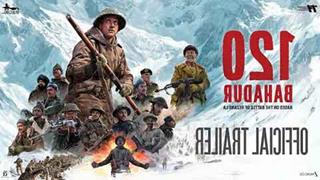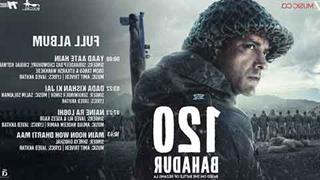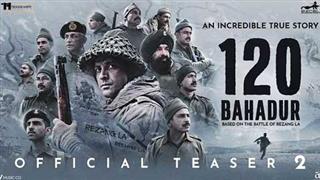Director: Razneesh Raazi Ghai
Rating: ***
War dramas are a familiar territory for Indian cinema, often following a predictable emotional and narrative pattern. 120 Bahadur, while stepping into the same landscape, strives to break the mould with its commitment to authenticity and respect for real-life heroism. The film gradually finds its rhythm, but not without navigating through familiar tropes and storytelling dips. Still, as the story unfolds, 120 Bahadur manages to leave a mark through its raw portrayal of sacrifice, duty, and courage.
A Cinematic Tribute Rooted in the 1962 Rezang La Battle
Based on the historic 1962 Rezang La battle, 120 Bahadur revisits one of India’s most extraordinary tales of bravery. The narrative is framed through the recollections of a radio operator, played convincingly by Sparsh Walia. Under the leadership of Shaitan Singh Bhati—portrayed by Farhan Akhtar—the 120 soldiers of Charlie Company, 13 Kumaon Regiment, fought relentlessly to protect the strategically crucial Rezang La pass from advancing Chinese forces.
The film focuses less on strategy and more on the emotional and physical toll of war. It highlights the extraordinary selflessness of soldiers who chose their duty over their own lives, forming the spine of this patriotic retelling.
Authenticity at Its Core: Real Locations and Real Emotions
One of 120 Bahadur’s biggest strengths lies in its visual authenticity. Director Razneesh Razi Ghai, the son of an Indian Army officer, holds a deep understanding of military life. His connection to the subject elevates the film’s realism—especially through his insistence on shooting in real locations instead of studio setups.
This creative choice pays off with breathtaking visuals. Cinematographer Tetsuo Nagata captures the stark beauty and unforgiving climate of Ladakh with stunning clarity. The landscape becomes a character in itself—harsh, humbling, and unfiltered. These moments stand tall as some of the film’s finest achievements, grounding the story in its historical reality.
Emotional Depth: Strong Potential, Uneven Payoff
While the first half visually impresses, it falls short in emotional impact. The film attempts to explore the loneliness and inner conflict of soldiers separated from their families. However, these moments feel functional rather than heartfelt. Flashbacks involving Shaitan Singh’s personal life—especially a song depicting his marriage with Raashii Khanna’s character—come across as forced and disrupt the tonal consistency.
This section of the film feels like it’s ticking narrative boxes instead of deepening the emotional stakes.
Second Half Surge: Where the Film Finds Its Heart
120 Bahadur truly comes alive in its second half.
Once the tension escalates and the soldiers brace for confrontation, the storytelling shifts into a higher gear. The battle sequences are intense, gritty, and unflinching. The film does not shy away from the brutal realities of war—bloodshed, pain, loss, and unwavering courage.
One especially poignant moment is the gesture of respect shown by the Chinese Army toward Shaitan Singh and his men. This scene helps the narrative regain emotional balance, emphasizing the universal respect for valor regardless of borders.
Performances: Strong but Not Flawless
Farhan Akhtar delivers a committed performance as Shaitan Singh Bhati. His screen presence is strong, and he carries the weight of leadership convincingly. However, his polished and distinctly modern tone of speaking occasionally breaks the immersion, making the audience aware of the actor rather than the character. Despite this, Farhan shines in the climax, redeeming any earlier inconsistencies.
Sparsh Walia fits seamlessly into the role of the radio operator, offering a grounded and sincere performance. Raashii Khanna, though adequate, finds herself limited by a role that doesn’t add much to the narrative.
Technical Strengths vs. Emotional Shortcomings
Despite its commendable technical execution—authentic locations, brilliant cinematography, and realistic action—120 Bahadur struggles to maintain a steady emotional grip throughout. What the film needed was a more cohesive emotional arc that matched its visual ambition.
The movie avoids excessive melodrama, which is refreshing, but in doing so, it sometimes loses opportunities to deepen its emotional roots. As a result, the impact that such a monumental story deserves feels diluted.
Final Verdict: A Sincere, Respectful Tribute That Falls Short of Greatness
120 Bahadur is undoubtedly made with sincerity and respect for the brave soldiers of Rezang La. It excels in authenticity, technical craft, and its unfiltered depiction of battlefield courage. However, the screenplay occasionally falters, and the emotional undercurrents do not always land with the force they should.
With a tighter script and a more consistent balance between sentiment and spectacle, 120 Bahadur could have transformed from a strong tribute into a truly unforgettable war drama.
In essence, it is a heartfelt film that honors real heroes—one that shines brightly in parts but stops just short of achieving a lasting cinematic impact.




















